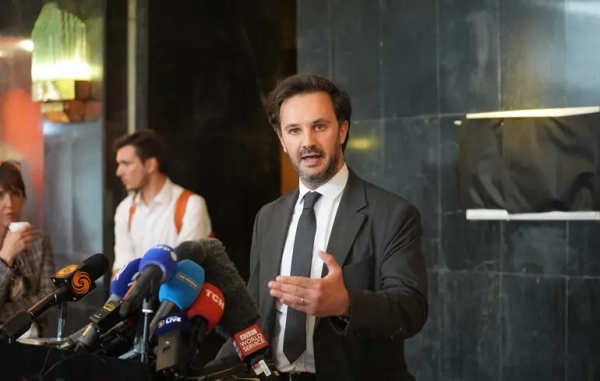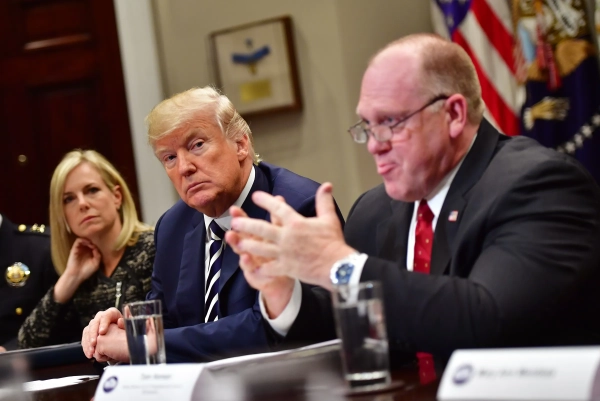
Right-wing commentators who argued for more than a year that there was no evidence of Russian involvement in the 2016 presidential election have reversed course after special counsel Robert Mueller and his team indicted 13 Russians and three Russian companies last week.
Now that there are legal attempts to punish those responsible, they’ve conceded something did happen. But to President Trump’s most loyal supporters (and Fox News), the indictments didn’t implicate Trump. They incriminated Barack Obama.
It’s true that the Obama administration was caught largely off guard by the real challenges presented by a Russian government interested in expanding both its military and political influence beyond its borders by any means necessary, which frustrated even members of Obama’s own team.
But as Obama was describing Russia as a relatively meaningless “gnat on an elephant’s butt” in 2014, his White House expanded sanctions against Russian billionaires and banks in an effort to curtail Russian encroachment into Eastern Europe. In addition, the administration expelled 35 Russian diplomats in response to Russian cyberattacks on the Democratic National Committee immediately following the 2016 election.
And the rapid shift on the right, including by members of Congress, from “no Russian involvement whatsoever” to “Russian involvement, but it was Obama’s fault” isn’t indicative of a desire to get to the bottom of what exactly happened during the 2016 election, but of a need to protect Trump, and Trump’s presidency, at all costs.
Obama dismissed Russia but sanctioned them too
To begin, many of the same Democrats who today are deeply suspicious of Russia’s influence or involvement in American institutions and elections, both past and future, were dismissive of those who voiced similar concerns six years ago.
In fact, during the final debate of the 2012 presidential debate, President Obama told then-presidential candidate Mitt Romney:
Still, that same year, Obama signed the Magnitsky Act, which sought to punish Russian officials who played a part in the death of a Russian accountant who exposed tax fraud committed by high-level government officials. The Magnitsky Act imposed serious sanctions on Russian individuals believed to be responsible for human rights violations, freezing any assets they held in the United States and barring them from entering the country. (The Global Magnitsky Act, enacted in 2016, extended the law to individuals residing anywhere around the world.)
In response, the Russian government barred Americans from adopting Russian orphans. (It was that legislation that Donald Trump Jr. allegedly told a Russian attorney could be reviewed if Donald Trump won the presidency during a June 2016 Trump Tower meeting that also included Jared Kushner and former campaign manager Paul Manafort.)
The nature of the relationship between Obama and the Russian government was typical of the past few administrations: sometimes confrontational, always complex.
Yes, Obama could have done more to counter Russian election meddling
It’s also true that Russians meddled in the 2016 election on Obama’s watch. Obama knew it was happening. And even Democrats feel he did not do enough. As Rep. Adam Schiff said on CNN last weekend, Obama’s team’s response to Russian involvement in the election was not “sufficient,” adding that they “were very wary to be seen as putting their hand on the scale of the election.”
In August 2016, Obama received a briefing that said Vladimir Putin was directly involved in a campaign to hurt Hillary Clinton and help Trump win the election. He had his aides assess the safety of the American voting system, he had the head of Homeland Security Jeh Johnson work with states to shore up security, and he had John Brennan contact the head of the Russia security agency.
But Obama did not make the information public, as Democrats on the Hill wanted. Republicans argued it should stay under wraps. According to then-Vice President Joe Biden, Mitch McConnell questioned the findings themselves, and others argued it would only help Russians to release it, or make it look like the Obama administration was stepping into the election to directly oppose Donald Trump.
As Biden told those in attendance at an event held by the Council on Foreign Relations in January, “Can you imagine if the president called a press conference in October, with this fella, Bannon, and company, and said, ‘Tell you what: Russians are trying to interfere in our elections and we have to do something about it.’ What do you think would have happened? Would things have gotten better, or would it further look like we were trying to delegitimize the electoral process because of our opponent?”
Obama also did not punish Russia immediately. It wasn’t until five months later, after the election was over, that the administration handed down sanctions based on the 2016 hacks. But at that point, it was clear to Putin that Trump was on his way in with a much more pro-Russia position.
“It is the hardest thing about my entire time in government to defend. I feel like we sort of choked,” a former senior Obama administration official told the Washington Post about how the Russia decisions were handled. The sentiment hasn’t changed for some in Obama’s circle:
Obama and his inner circle are contending with whether they did the right thing. When Trump tweets that Obama should have done more to counter Russian meddling in an American presidential election, there’s a legitimate issue there. But his tweets aren’t being written in good faith. They’re being written as a means of self-preservation.
Before Trump argued “no collusion,” he argued that there was never a Russian hack in the first place
Throughout the 2016 campaign and afterward, Donald Trump did not take Russia’s efforts to alter an American election seriously — even during the Republican primaries. When he wasn’t “jokingly” asking the Russian government to leak Hillary Clinton’s emails, he was denying Russian involvement in the 2016 election — again and again and again.
President Trump’s personal views on Vladimir Putin and Russia’s potential involvement in the 2016 election have been well established: He thinks that a good relationship with Putin would be “an asset, not a liability” for the United States. And he was more than willing to discount intelligence reports to the contrary even before he won the Republican nomination.
When news broke in June 2016 that the Democratic National Committee had been hacked and opposition research on Donald Trump leaked, most likely by Russian hackers working with members of the Russian intelligence establishment, Trump’s first response was to accuse the DNC of hacking itself. He said in a statement, “We believe it was the DNC that did the ‘hacking’ as a way to distract from the many issues facing their deeply flawed candidate and failed party leader.”
He would repeat that sentiment on RT America (a Kremlin-backed television station) in September 2016, saying “I think it’s probably unlikely” that Russia was behind the DNC hack. “I think maybe the Democrats are putting that out. Who knows? But I think that it’s pretty unlikely. But, you know, who knows?” And during the second and third presidential debates, he would again argue that “maybe there was no hacking” and even if there was, “our country has no idea” who is behind it.
In an interview with Time magazine on November 28 following the election, Trump said again that he didn’t believe Russia interfered in the election in any way. “I don’t believe they interfered. That became a laughing point, not a talking point, a laughing point. Any time I do something, they say, ‘Oh, Russia interfered.’”
When the Washington Post reported on December 9 that the CIA concluded Russia intervened in the election to support Trump, Trump responded with a statement saying, “These are the same people that said Saddam Hussein had weapons of mass destruction. The election ended a long time ago in one of the biggest Electoral College victories in history. It’s now time to move on and ‘Make America Great Again.’”
The denials continued into 2017. In February 2017, Trump said in a press conference, “The whole Russian thing, that’s a ruse. That’s a ruse.” After firing FBI Director James Comey in May 2017, Trump told NBC News’s Lester Holt, “When I decided to just do it, I said to myself, I said, ‘You know, this Russia thing with Trump and Russia is a made-up story, it’s an excuse by the Democrats for having lost an election that they should’ve won.”
In November 2017, Trump said he believed Putin’s assertions that his government did not meddle in the 2016 election, telling reporters aboard Air Force One, “Every time he sees me he says, ‘I didn’t do that,’ and I really believe that when he tells me that, he means it.” And even as recently as last Wednesday, CNN reported that Trump still remained unconvinced that Russia meddled in the 2016 election.
Trump and Fox News think the Mueller indictments exonerate him. They don’t.
Now conservatives and Fox News who once argued that Russian interference in the 2016 election was “fake news” are declaring that Friday’s indictments somehow offer an “implicit exoneration of his campaign” regarding accusations of alleged “collusion” between the campaign and Russian operatives. The interference began in 2014, long before Trump’s run for the White House, they say, and the indictment describes Trump campaign officials as “unwitting” accomplices in Russian efforts to influence the electorate. And Fox News spent last weekend declaring that Mueller — whom Sean Hannity said was conducting a “witch hunt” mere weeks ago — had exonerated the president entirely.
First and foremost, the Mueller investigation is still ongoing, and Friday’s indictments are just a piece of a comprehensive strategy that neither Trump nor Fox News nor the American public can see the end of just yet. And second, Trump’s year and a half of denials of any Russian involvement in the 2016 presidential election doesn’t go away simply because he has now decided that interference — interference that acted to support his candidacy — did take place, just not under his purview.
But as we’ve seen before, Trump’s primary objective is to protect himself. And Trump-supporting conservatives and media outlets will do the same.
Trump’s attitudes on Russia have made him an enemy of his own party
In office, Trump’s stance on Russia and Russian electoral interference has stalled the government’s ability to react to it.
His administration still refuses to put in place major sanctions against the Russian government, despite the fact that they passed Congress nearly unanimously last year as a direct response to Russia’s actions in the 2016 presidential race, with broad support from conservative lawmakers.
To be sure, Trump’s national security apparatus has taken a stance on Russia that some conservatives have deemed to be far stronger and tougher than Obama’s. That’s because, as Rolling Stone’s Zach Dorfman has noted, Trump’s friendly perspective on Russia is not shared by either his Cabinet or Republican members of Congress. As a result, his administration has ordered the Pentagon to be far more aggressive in its efforts to deter Russia from using nuclear weapons in Europe.
And in August 2017, the Trump administration closed the Russian Consulate in San Francisco, a major Russian diplomatic facility (and allegedly also a base for spying). And it was Trump who approved the sale of $41 million worth of arms to Ukraine’s government in December as it continues to fight pro-Russian rebels in the country’s east.
Trump’s national security adviser says “the evidence” of Russian involvement in the 2016 election “is now really incontrovertible and available in the public domain,” and other members of the administration have talked tough on nuclear weapons proliferation and closing consulates. Still, Trump himself has taken Putin’s word over those of his own intelligence agencies, his hand-picked national security officers, and his own government.
Mueller is pushing ahead on the investigation, and Republicans are desperate to protect Trump, from Mueller and from himself. And Trump is too. He fired James Comey to end the Russia investigation and he’s pressured Attorney General Jeff Sessions again and again on his decision to recuse himself from that investigation. Even today, he’s questioning why Obama isn’t receiving more blame.
And yes, Obama might deserve criticism for his actions during the 2016 presidential election. His inaction was costly. But that won’t change anything for Trump, who on Russia seems to stand alone.
Sourse: vox.com






